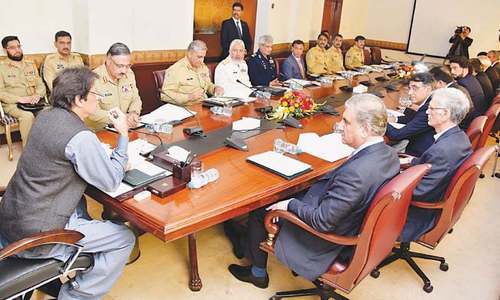ISLAMABAD: A parliamentary committee was on Thursday informed that the draft of the first National Security Policy of its kind would be submitted to the National Security Committee headed by the prime minister soon.
“The National Security Division (NSD) is working on the draft. We have done maximum sessions with all stakeholders, including the army chief, joint chief of staff and others. The draft is at the final stages. In the light of the vision of the PM, this draft will not only be talking about national security but also institutions, declining standards and those areas which were never touched in security documents before,” NSD Secretary Dr Iqbal Hussain Durrani informed the National Assembly Standing Committee on Cabinet Secretariat.
The committee met for a briefing on the performance of the Cabinet Division and functions of its attached departments.
The draft will not only cover national security but also institutions and areas never touched in security documents before, official says
In his briefing, Dr Durrani said the National Security Policy was the first model document. The division started working on it a couple of months ago.
“The impetus was given in December last year by the prime minister. Initial work on the policy was done by all chiefs of the armed forces. This is a very comprehensive document in which we have focused on core areas. This will be the first document which will be placed before the National Security Committee once we complete it by the end of this month. After approval of the PM, it will become policy of the government of Pakistan,” Dr Durrani told the members.
The official also explained that NSD was a think-tank to perform research work to address issues such as during emergencies. The fairly new division is an initiative for peace, stability and security in the country and its purpose is to achieve social justice, social equality and development.
The NSD is the secretariat of the National Security Committee (NSC), which is the main organ of the country and headed by the PM with heads of armed forces as its members. The division convenes, coordinate formulate and implement strategies prepared for national security.
The committee also demanded future plans of the government to pull PIA out of the Rs400 billion annual losses.
Secretary Aviation Shahrukh Nusrat informed the members that the CEO was scheduled to present the new business plan to the prime minister on Wednesday afternoon.
“We cannot share its details until the prime minister approves it. However, the PM gives PIA top priority,” said the secretary.
The official said the open sky policy was extremely damaging the national flag carrier.
Read:On the new national aviation policy
“Because PIA does not have the capacity to transport the increasing numbers of passengers from Pakistan to Middle East, airlines such as Etihad, Emirates and Qatar Airways took advantage of it and continued to benefit from it. However, after the PM approves the aviation policy, we will review all air services agreements. Its purpose is to adopt the principle of reciprocity on sharing passenger traffic.”
Giving an example, the official explained how PIA could only pick 85 passengers from Tokyo besides limiting cargo causing Rs300 million losses every month.
“After re-negotiations, PIA can pick 30 per cent more passengers, including 30pc more cargo which will not cause any loss to PIA,” he said.
He also explained how the Cabinet Division had decided to separate regulatory operations and PIA’s functions as a service provider for which plans were in the making to be presented in the cabinet on how soon this objective can be achieved.
He said the National Aviation Policy, which was under implementation, pays special attention to domestic travel to minimise inconvenience to passengers on local routes.
The meeting was informed that the national flag carrier was operating 32 aircraft — eight PIA-owned Boeing 777 and four on dry lease, 11 Airbus 320 on dry lease, four PIA owned ATR 42 and five ATR 72 on dry lease.
Some of the challenges, according to the official, were the 250 plus extra staff against one aircraft, difficulties in fleet upgradation due to lack of finance, enormous competition from Middle Eastern Airlines, frequent cases of narcotics smuggling and what he called the unfair open sky policy.
Published in Dawn, April 5th, 2019















































Dear visitor, the comments section is undergoing an overhaul and will return soon.